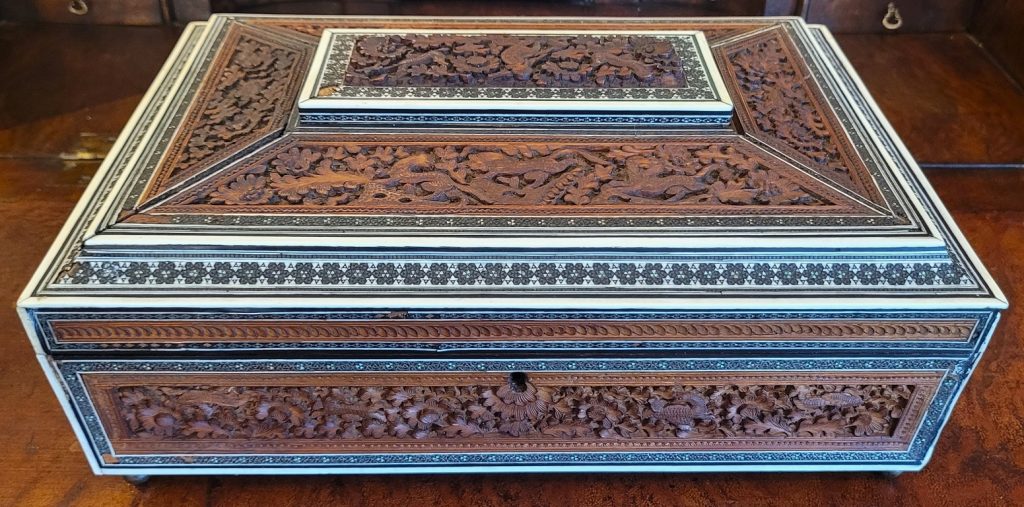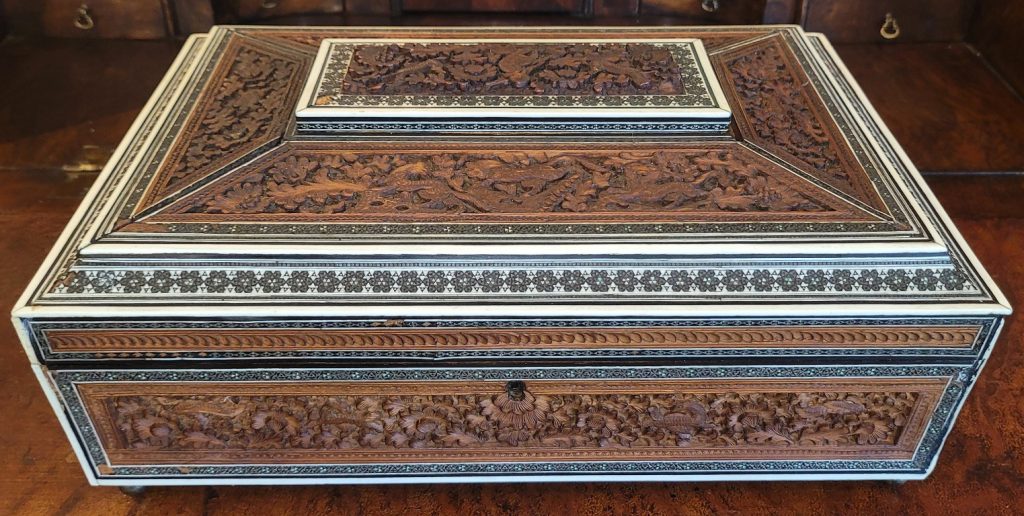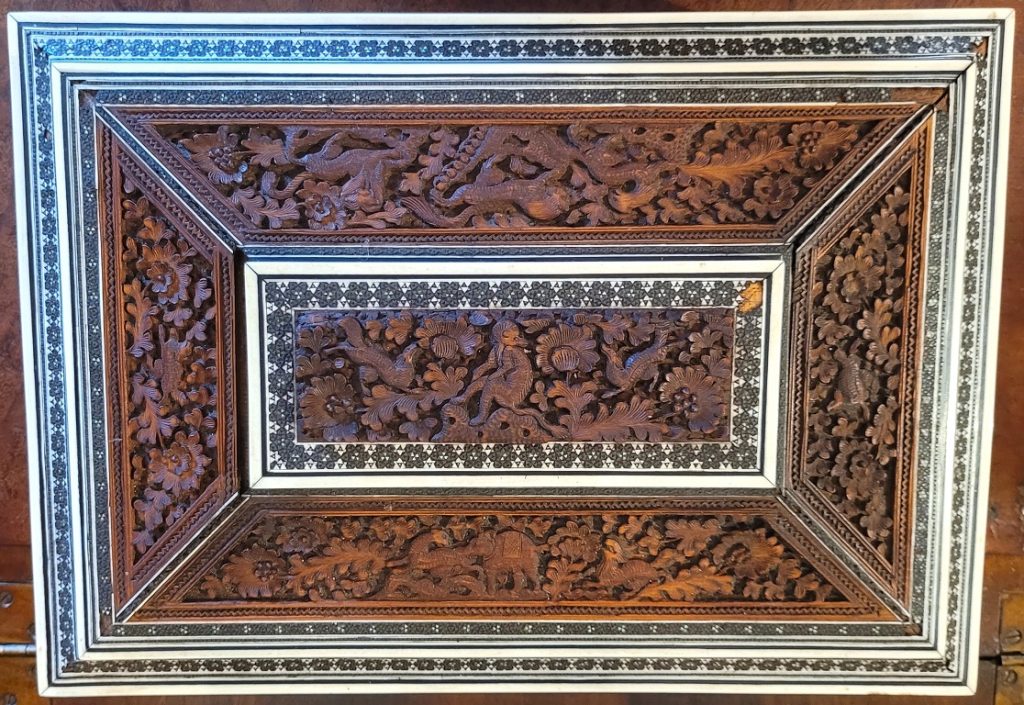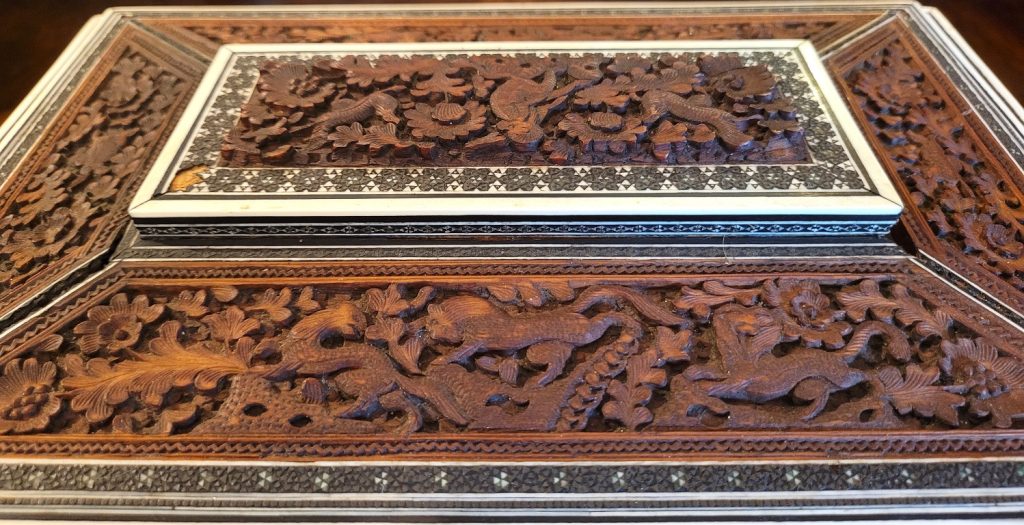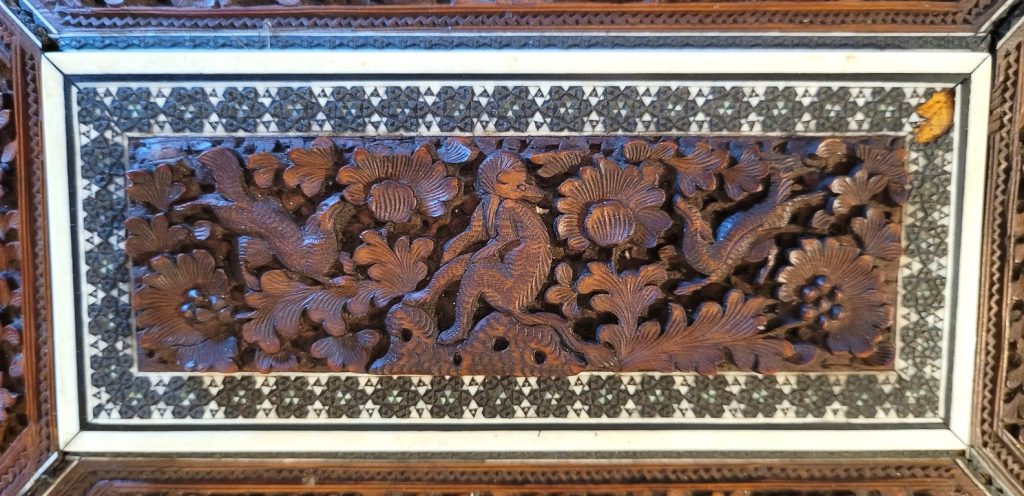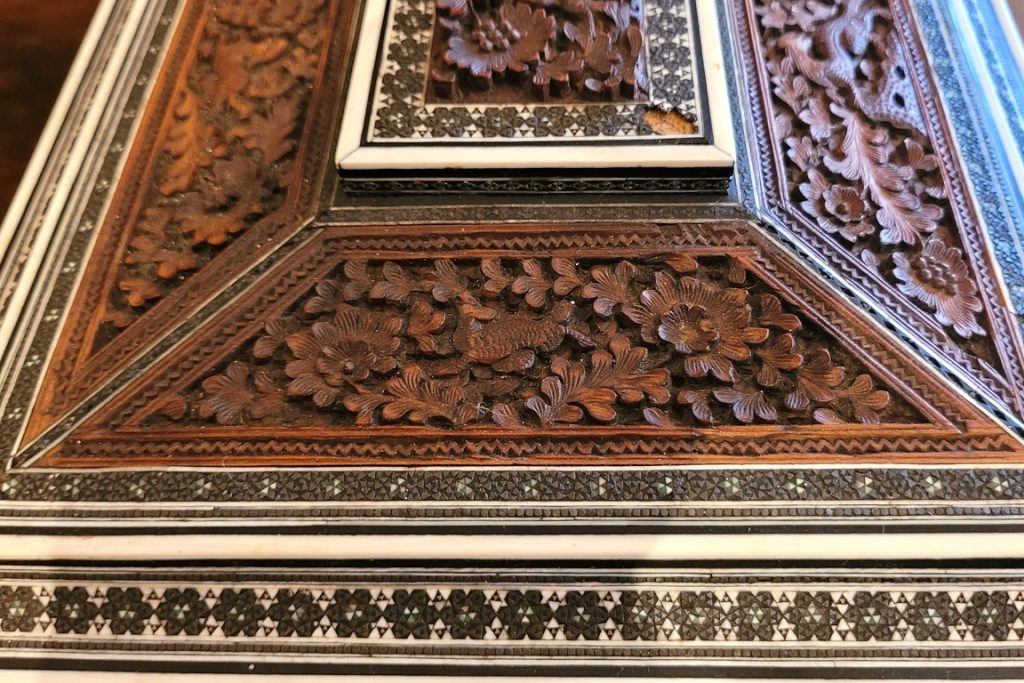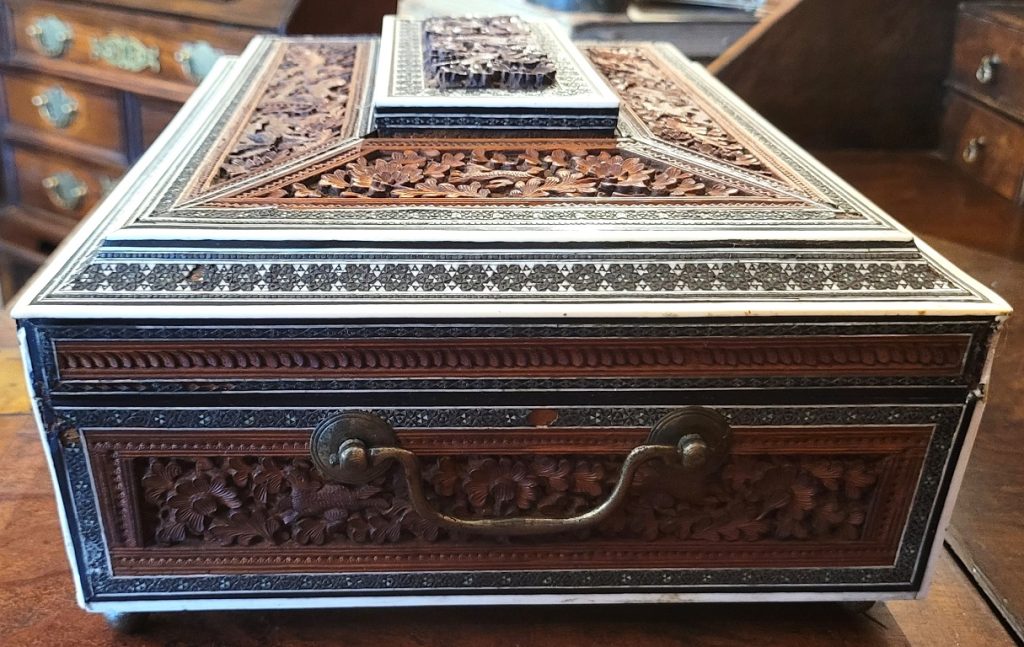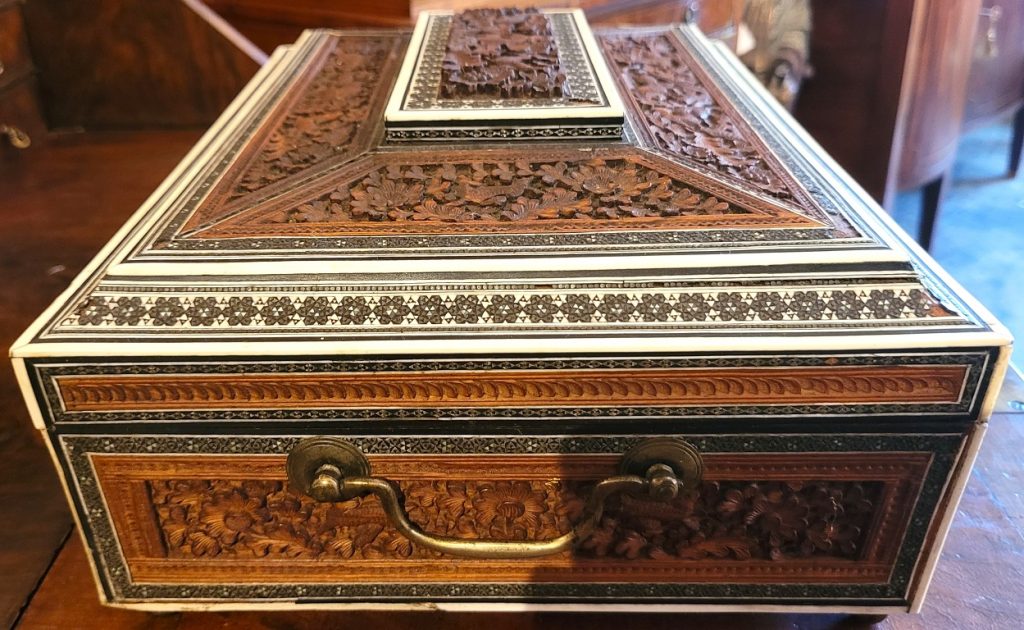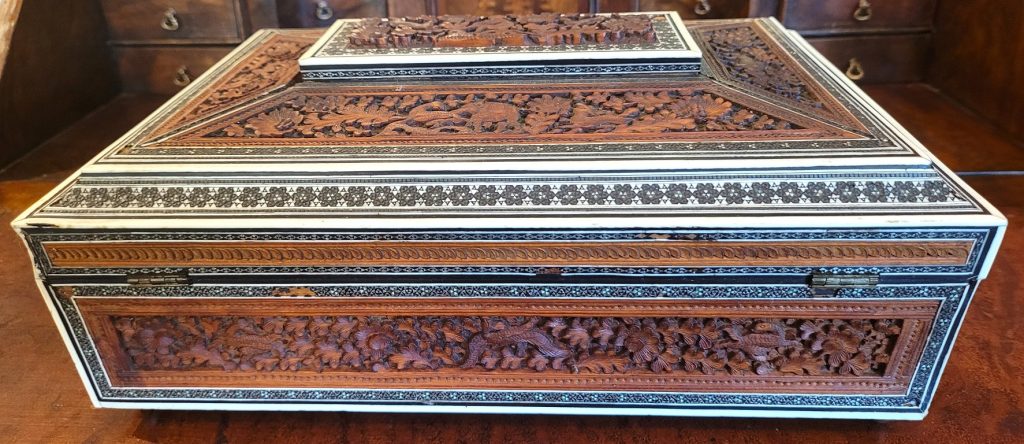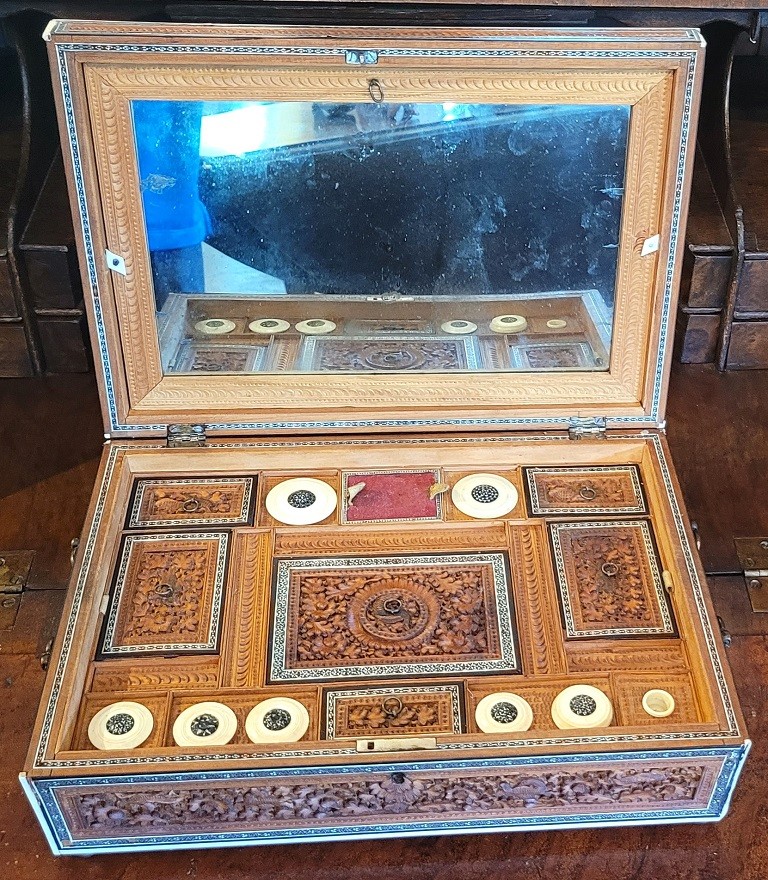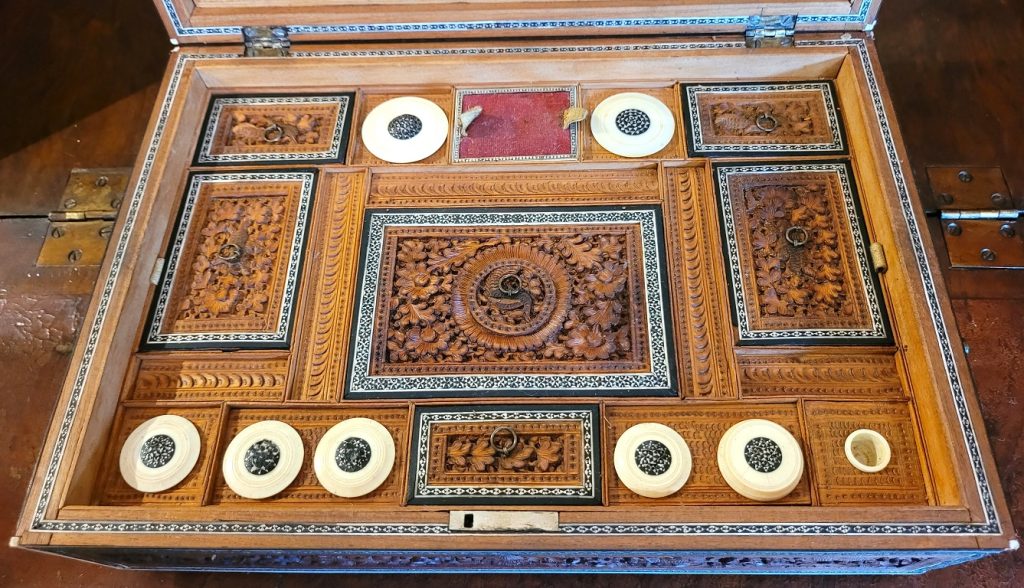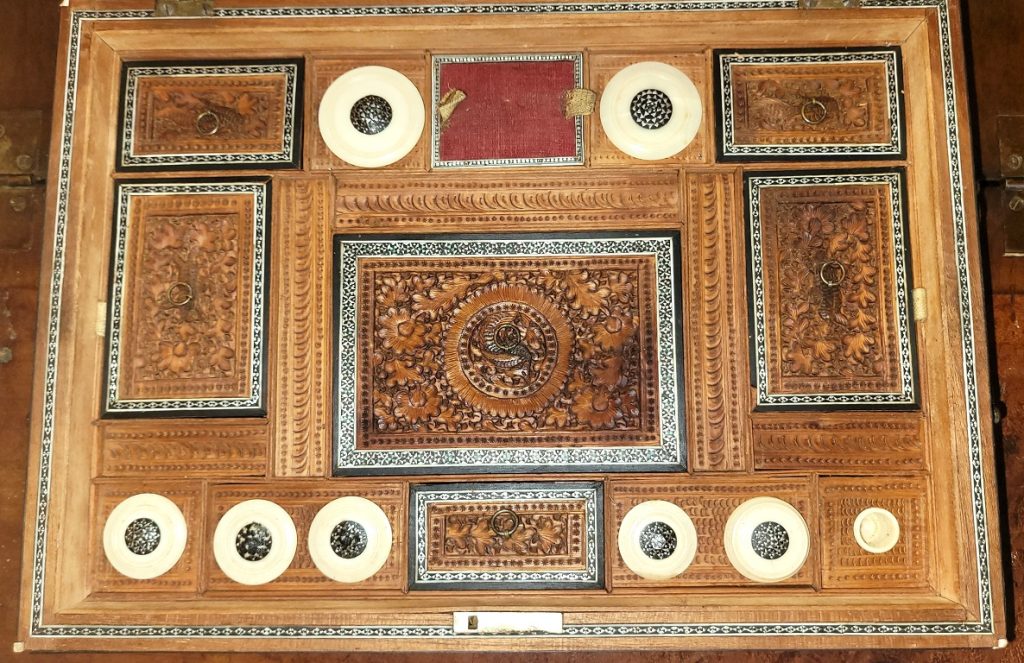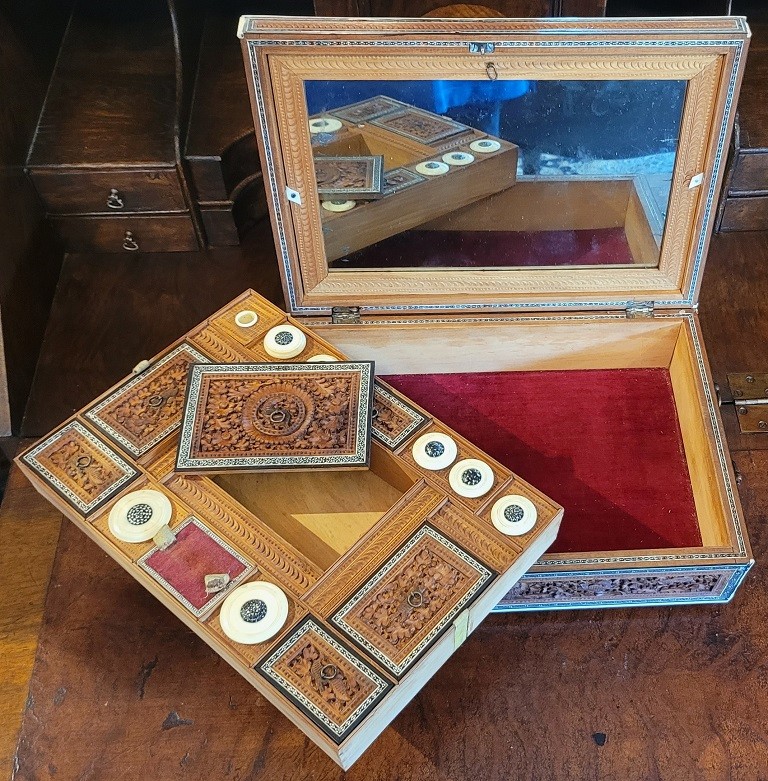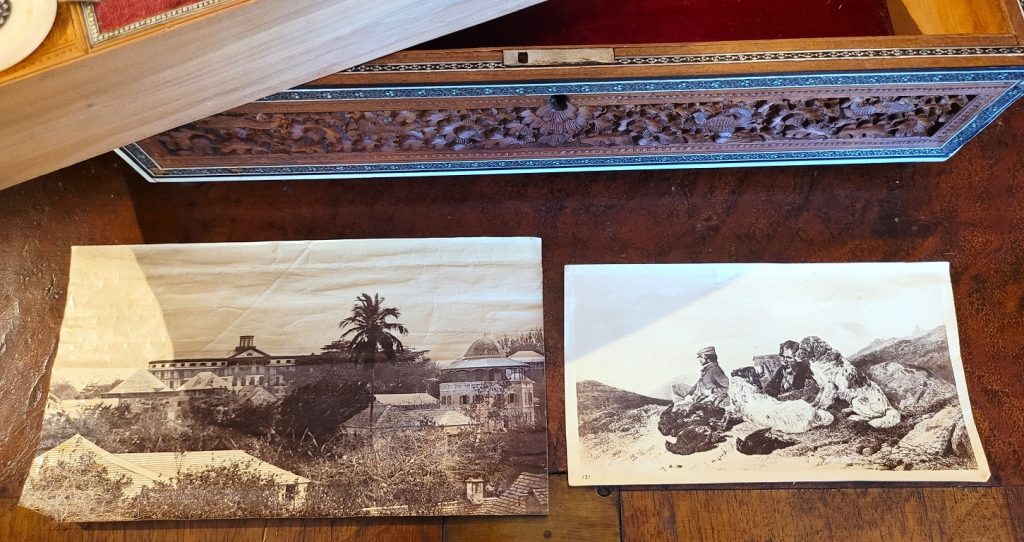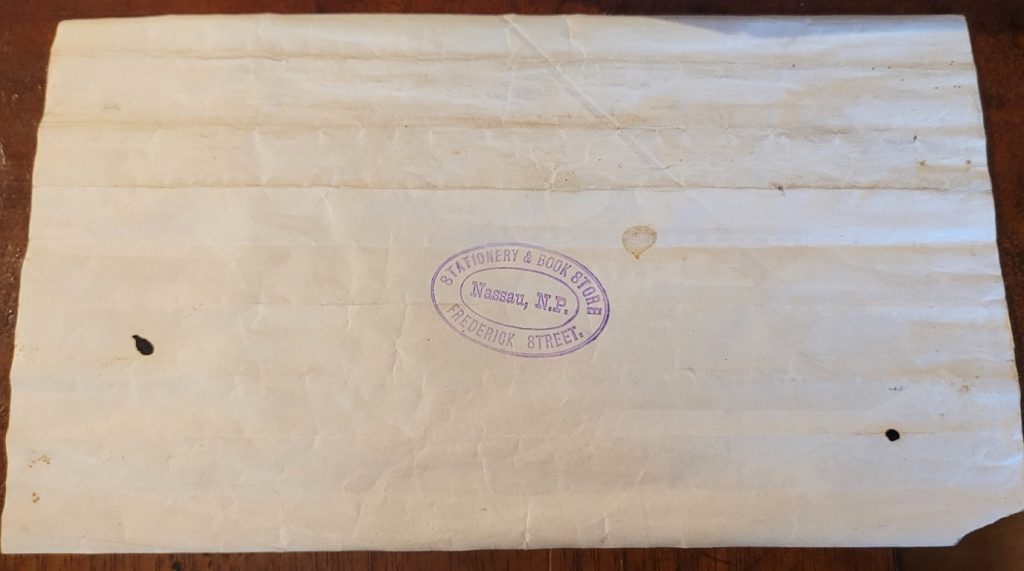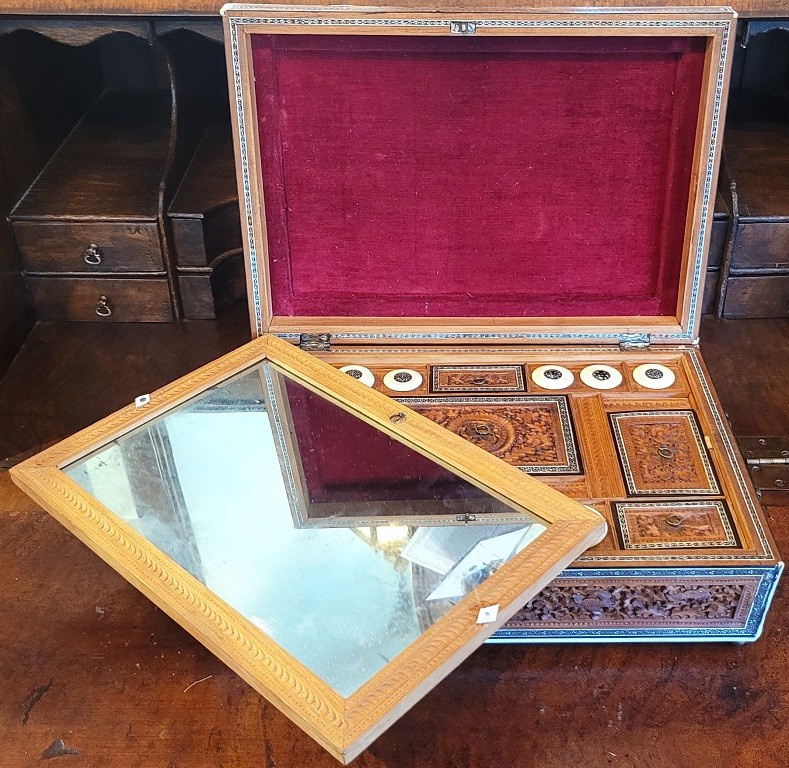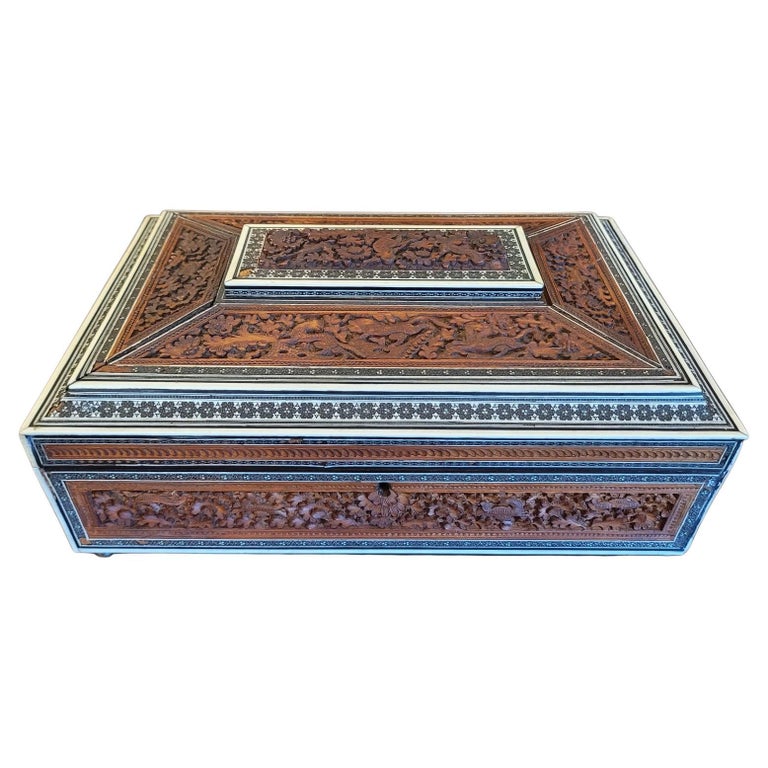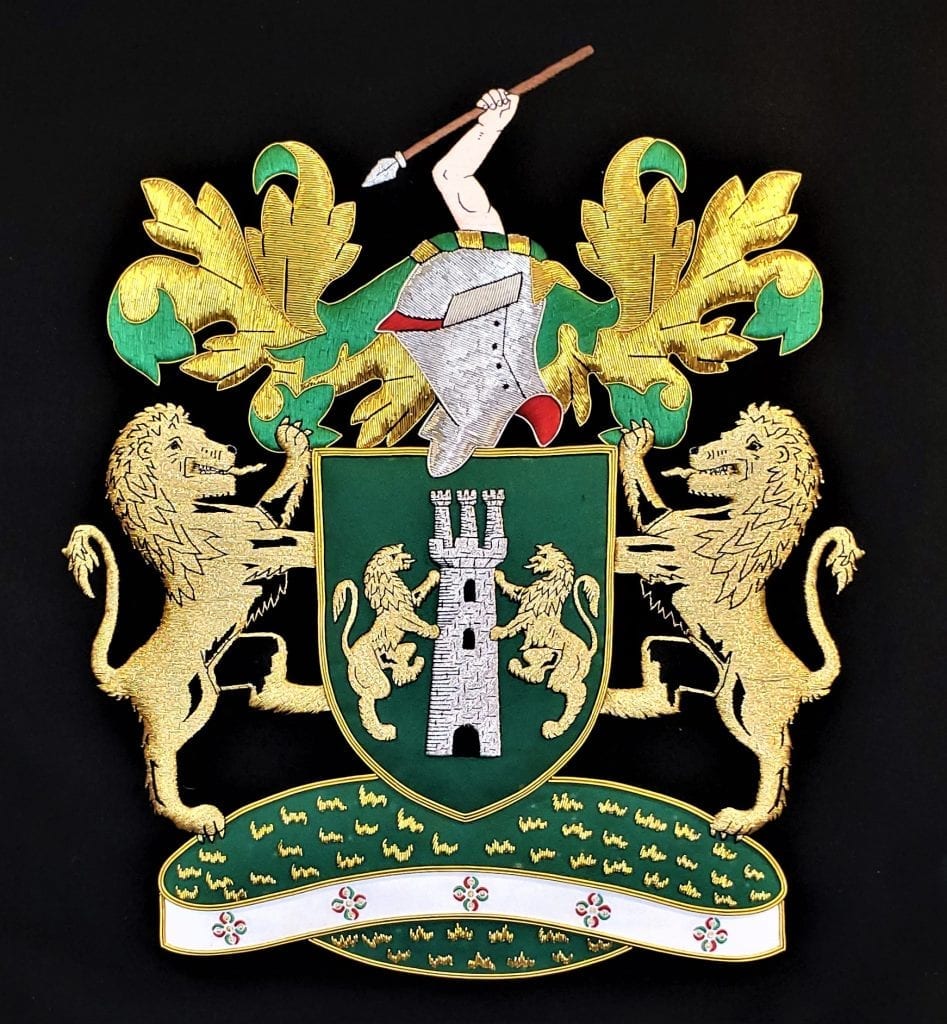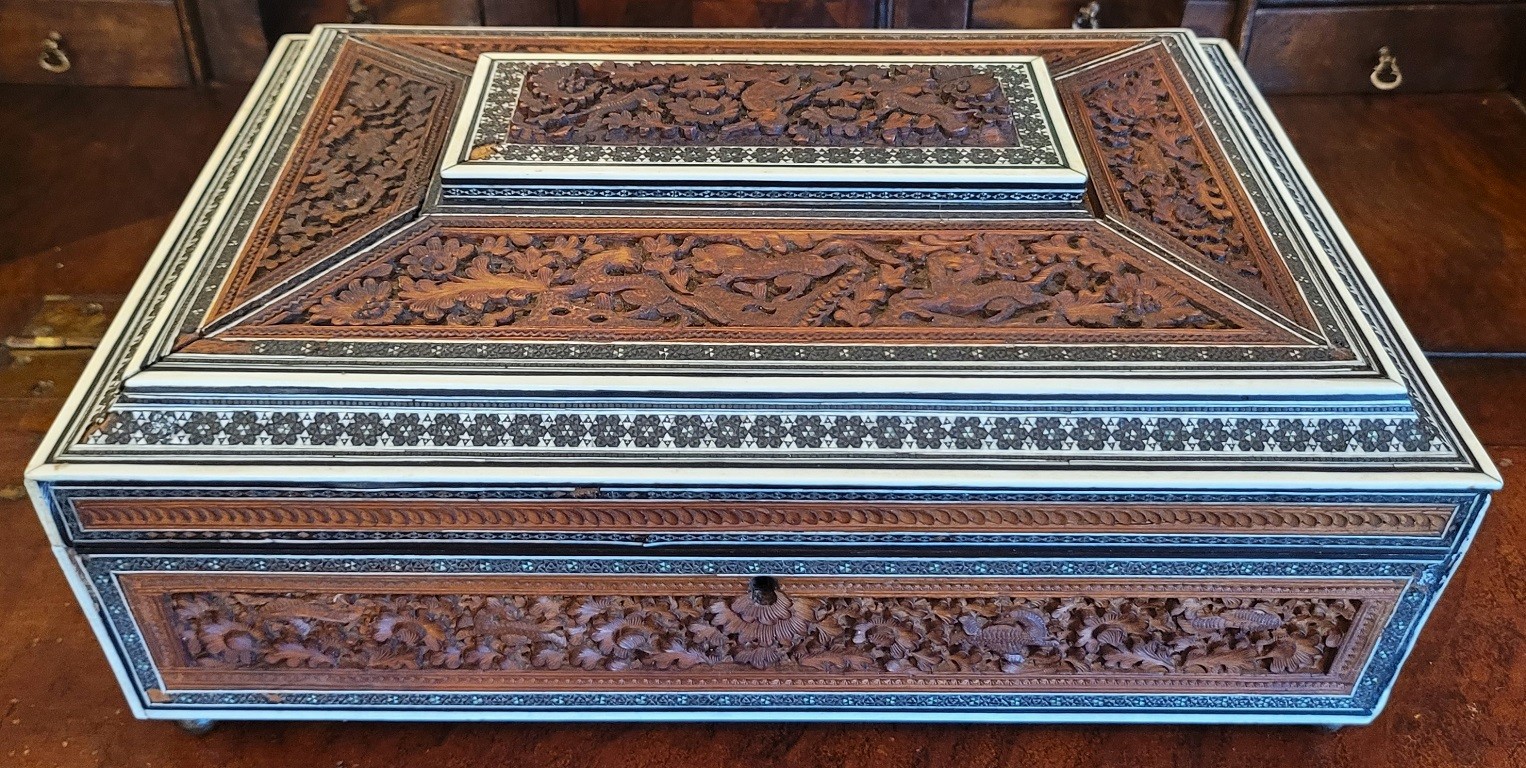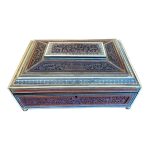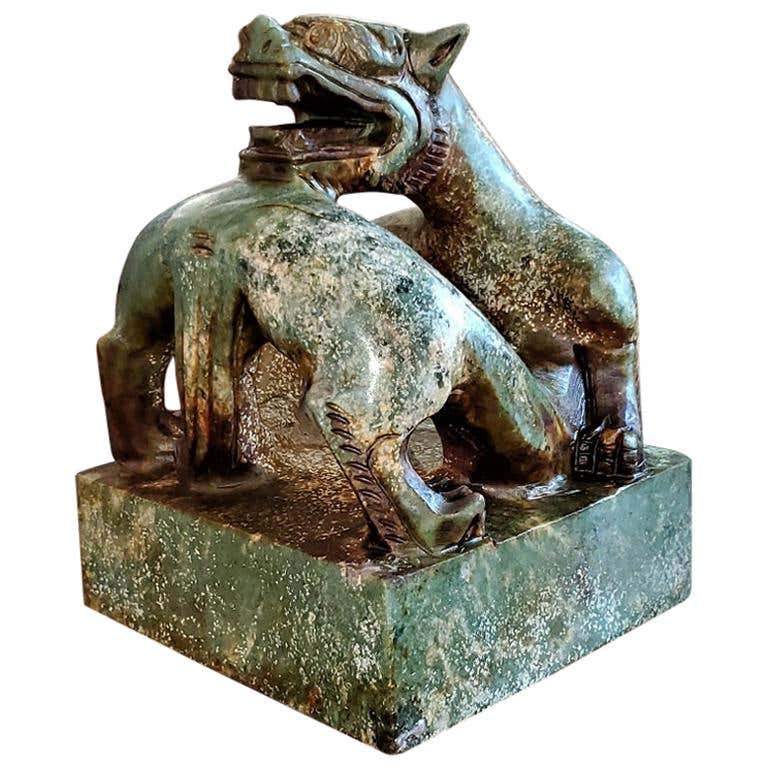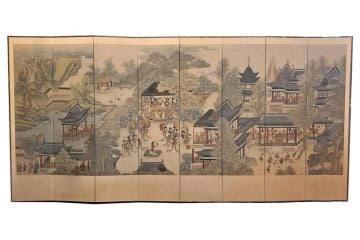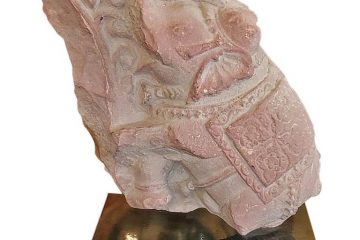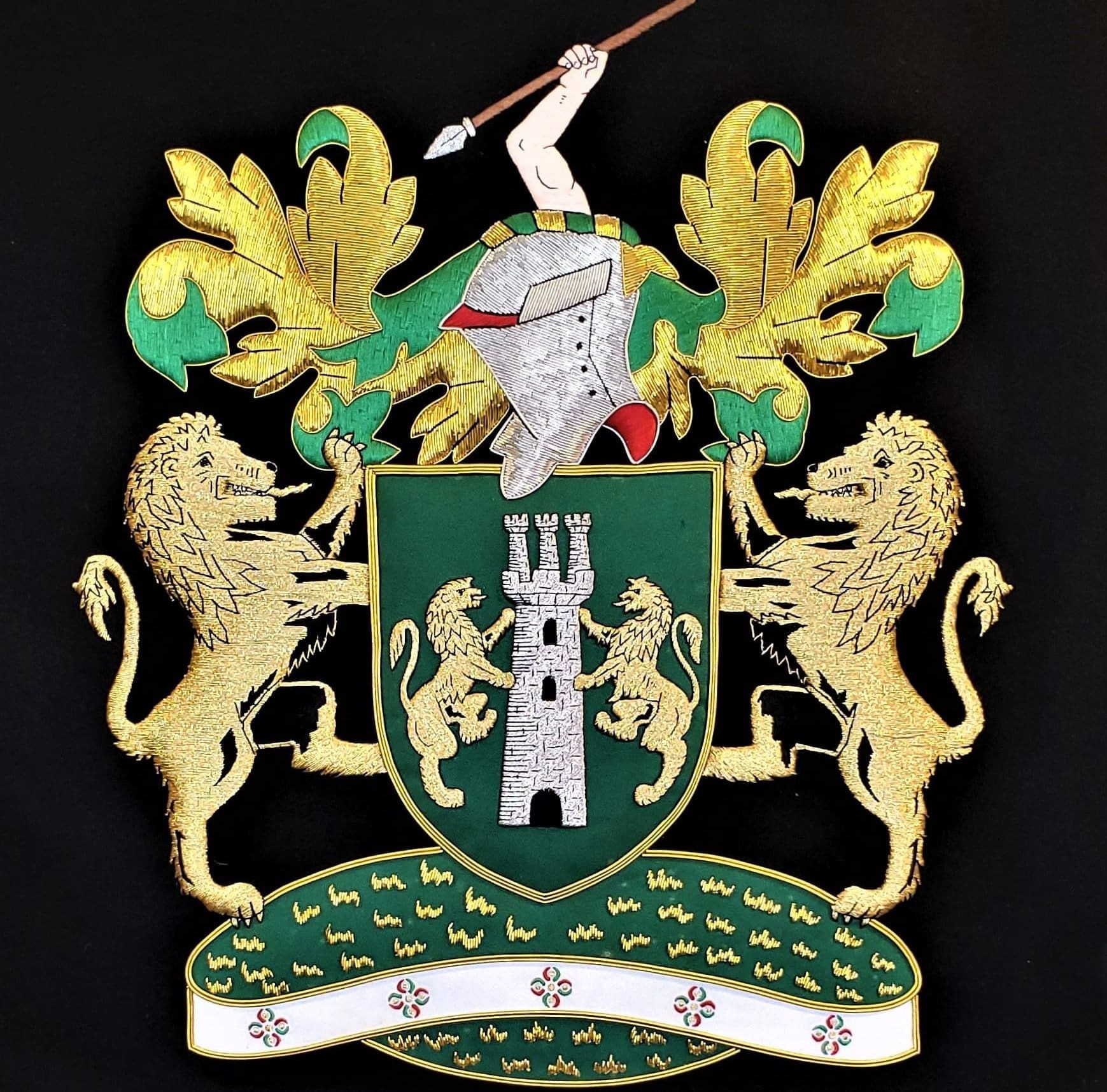19C Anglo Indian Highly Carved Teak and Sandalwood Sadeli Mosaic Sarcophagus Sewing Box
PRESENTING A GORGEOUS 19C Anglo Indian Highly Carved Teak and Sandalwood Sadeli Mosaic Sarcophagus Sewing Box.
Made in Bombay, India circa 1860-80.
Box made of sandalwood with highly carved teak wood reliefs and panels on all sides.
Edged with bone and ebony veneers and glorious sadeli mosiac, made from tiny pieces of faux ivory, pewter, green semi-precious stone.
The box is in a sarcophagus form with domed lid.
The original brass carry handles are on the sides.
The interior is in great condition and consists of a removeable mirror under the lid portion, with the original red velvet lining behind it.
The base is removeable and contains a number of lidded compartments.
6 of the interior lids on the base, are each inlaid with sadeli mosaic banding. The rest are also carved and chased.
The interior is fully complete with 7 lidded faux ivory/bone, thread canisters with sadeli domes and the original bone thimble.
The box sits on 4 brass ball or bun feet with the original velvet lining on the base.
Some minor repairs and losses, but this box is fully complete. This is ‘rare’ as many of these boxes have not survived in such condition!
Included in the sale are 2 photos that were in the box (under the base tray). Interestingly, one of them is a view of downtown Nassau, New Providence (Bermuda) from the early 20C and stamped on the rear. What a ‘journey’ this piece has made! Made in India … travelled to Bermuda, probably via Britain … back to Ireland (where we bought it) …. then to Texas!
These boxes were made by superb Indian craftsmen, specifically for sale to the ruling British elite. These types of boxes, carved teak or padouk and sandalwood, (whilst beautiful and superbly crafted) were of a lesser quality, than the more profusely and intricately mosaic inlay, tortoiseshell and ivory boxes, made for the British ‘Upper Classes’ in the areas of Bombay and Vizagapatam. These type of boxes were much more affordable back in 1880 (and indeed today) and would probably have been bought by mid-level diplomats, civil servants or visitors.
Sewing boxes (in general), were in EVERY Victorian home in Britain in the 19th Century and like other boxes etc were ‘status symbols’ of your place in society! The more ornate the box, the more ‘Upper Class’ you were!
Of it’s type, this one, is one of the very higher quality one’s, than the norm!
SADELI MOSAIC: “Anglo Indian boxes were made in India for the English residents from the early part of the 18th century. They were brought back or sent back to England usually by the people who had commissioned them. From the beginning of the nineteenth century they were imported more commercially, although not in any significant numbers until the middle decades. They were very highly valued, especially the early ones, to the extent that the designs were copied on late 19th and early 20th century tins.
The ancient art of Sadeli Mosaic is said to have been introduced from Shiraz in Persia via Sind to Bombay, a long time before the Anglo Indian boxes were made. It was a technique, which required a high degree of skill and patience. It was executed very lavishly, in that the frequent cuts wasted a great amount of the precious materials used. The workmanship was however more than commensurable to the value of the materials.
Ivory, silver, pewter (or other metals), wood and horn were cut into faceted rods which were bound together to form geometric patterns. When the glue has set, the rods were sliced in transverse sections. This gave the maker a number of angled circular pieces in the original pattern. Several variations of patterns could be achieved by combining the materials in different ways. The ivory was sometimes dyed green to give an extra color.
The mosaic pieces in a combination of patterns, often separated by ivory, ebony, horn or silver stringing were used to veneer sandalwood boxes. In the early boxes, which date from the turn of the 18th to the 19th century, there are large panels of mosaic covering tops and sides of boxes. It took incredible skill to cover such large areas without any shakes or wavering of the pattern. The corners and joins on these boxes are impeccably matched.
The makers (reputed to be Persian) of Sadeli mosaic made in the first two decades of the 19th century displayed a total understanding of the qualities of the different materials they used. They combined substances, which can expand and contract according to atmospheric conditions with others, which are hard and unyielding. The result was a sharp definition of the lines and patterns, which made up the whole design.
On the early boxes the designs look deceptively simple. The fact is, they emerged from a culture, which had mastered geometry and understood how to generate a pattern from a set number of points. The patterns are so harmoniously combined that their incredible complexity is not immediately apparent.
The earliest Sadeli boxes are of simple rectangular shapes. The combination of the diverse patterns is a triumph of artistic judgment, impeccable workmanship and deep respect for the material in hand. The boxes have an opulence emanating from the richness of the materials, yet the total control of these materials and the cerebral nature of the overall designs give them a restrained dignity. These early Sadeli boxes are now very rare indeed.
The carved Anglo Indian boxes fall into two very distinctive categories:
1. Early 19th century sandalwood boxes which were finely carved with repetitive floral and bird motifs and
2. Later 19th and 20th century wooden boxes much more crudely carved with or without late period Sadeli mosaic.
There are of course variations in the quality of these later boxes and some of them are very striking.
Boxes from the first category are very rare. “
Link: http://hygra.com/anglo.html
19C Anglo Indian Highly Carved Teak and Sandalwood Sadeli Mosaic Sarcophagus Sewing Box
Provenance: Part of our Extensive Anglo-Indian Collection (bought at Auction in Ireland).
Dimensions: 5.5 inches Tall, 12.8 inches Wide and 9.15 inches Deep.
Condition: Very good original condition. Some minor losses and professional repairs.
SALE PRICE NOW: $1,250
